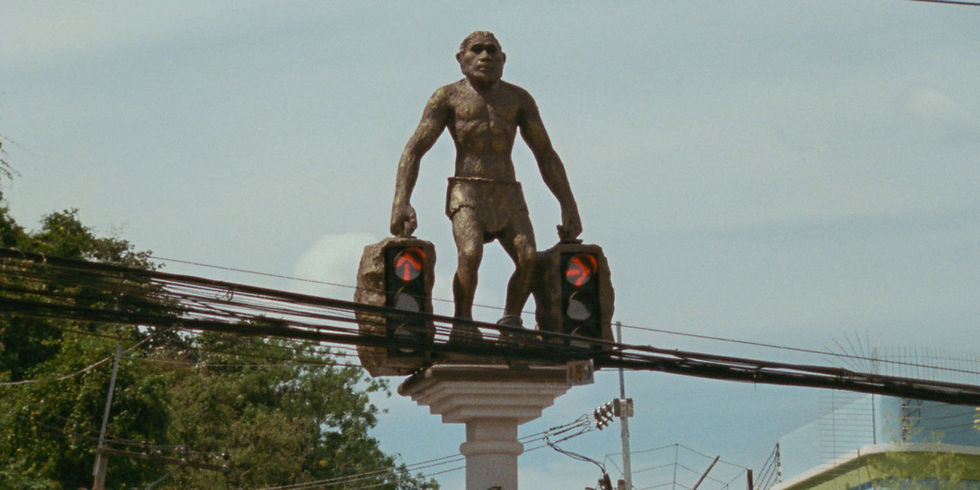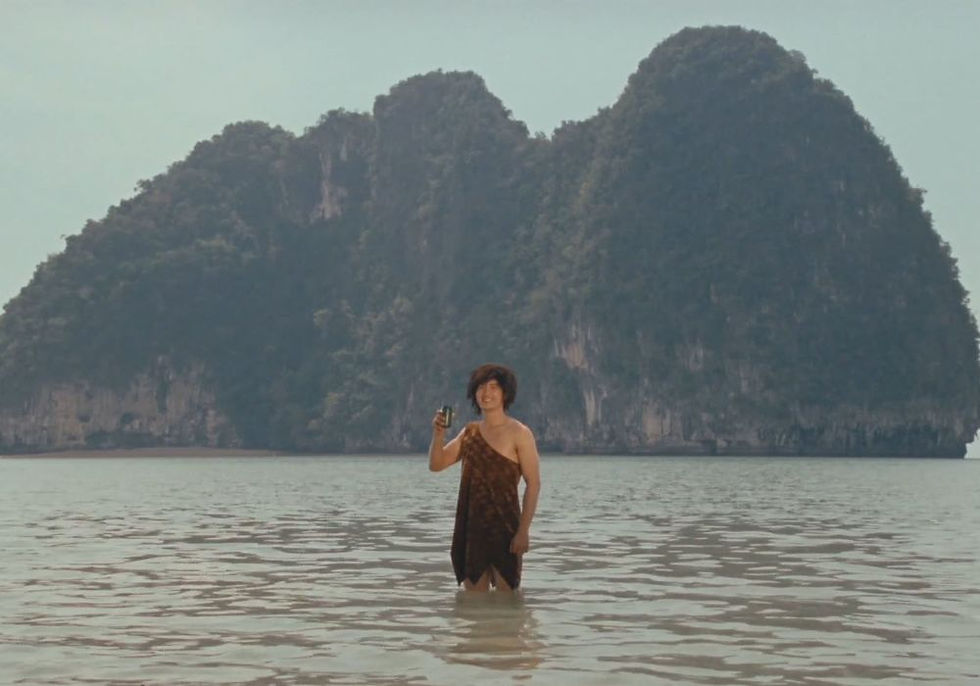Cultural Homage or Harm? Krabi, 2562 (2019)
- Leo Barton

- Oct 20, 2019
- 7 min read
Krabi 2562 is a bizarre film born out of relatively mundane circumstance. In short, director Ben Rivers was commissioned to create a short film for the Krabi Biennale in 2018 and, with the help of his close Thai friend and fellow director Anocha Suwichakornpong, this project was turned into a feature the following year. However, although I am not hugely familiar with Suwichakornpong’s work, Krabi didn’t contain any of the illusive dream-like draw which caused By The Time It Get’s Dark to have such a strong and lasting impression on me. Furthermore Ben’s presentation of the film in the Q&A which followed the film suggested Anocha’s input to be somewhat secondary, a mediator between a non-Thai-speaking Brit and the country he was trying to create something in response to. As such, for the purpose of this article we will take Ben Rivers as the primary creative force and interpret Anocha’s involvement as one closer to a creative producer.
Here, then, we encounter the meat of what I found challenging about the film—the complications of a foreign director shooting a film as a tourist.

Firstly, let us look at the film-text itself (which will be supplemented by Ben Rivers’ own words later on). The film meanders around the province of Krabi, introducing us to a number of tenuously linked people wafting around—locals, filmmakers and foreigners, and a group of early humans, all coexisting but rarely mixing—and focusing on areas of radical cultural difference. Thus the presence of the foreign creator is revealed twofold; through the choice of subject and their presentation. Scenes are often separated by or interjected with unique images or sounds of Krabi, such as unique stone-age-themed traffic lights or the sound of military drills. However their presentation, one of brevity and fleeting exploration, is the more intriguing element as it somewhat undermines their inclusion. As each of these small details flashes up, obviously rich in meaning through their worldly existence, we are often left with it as a snapshot but no information. Each image promises a world of relevance and importance, but such knowledge is withheld from the viewer—this could be either because it is irrelevant, or the filmmaker is unaware of its importance (or, thirdly, the film is obtusely referencing things far beyond an international viewers’ periphery—and it could easily be argued that this film was made for international audiences). As such each of these rich icons becomes a simple reference, like an image on a post-card which reveals only one, somewhat shallow, surface of the truth.
Moreover, as I progressed further into the film, it began to dawn on me that each individual who was depicted in a framework closer to documentary (a number of scenes are portraits of people living in Krabi) was an outlier—an obscure individual. The two key figures portrayed in this way are a singular old man describing his lifetime in Krabi, endlessly confusing dates and events, and a cinema caretaker, who was previously the projectionist until the establishment closed its doors in the 80s. The latter features more prominently, straddling both the documentary and fictional modes of filmmaking, and quickly became an audience favourite due to his obscure facial hair composed of a light moustache and a single stream of long, white, hairs dangling just left of his chin. These individuals, of course, exist and I mean no disrespect in labelling them as “outliers”—but such a label was, somewhat more disturbingly, implied by Rivers in the films Q&A, where he remarked ‘as soon as we met, with his asymmetrical white streak of hair blowing in the breeze, I knew he needed to be in the film’.*

This statement, from any filmmaker, of course implies there was something of interest found in the person. And, yes, his inclusion in the film is also due to his inherent connection to cinema as a projectionist and cinema-caretaker. However, when I began to pair this sentiment with the film’s frequent references to culture in Krabi which were always highlighted through bizarre difficulties, this began to concern me. It brought one question to mind—are these subjects being looked at for their histories, stories, or information, or are they simply being poked (fun) at for their oddity?
Unfortunately, as the Q&A unfolded, and information slowly oozed out about Rivers’ original lack of knowledge about Thailand, and the film’s conception after a few brief visits to the country. Combining this with his comments marking differences—from the country’s military “dictatorship” to its relationship to tourism—the film’s mode of address tended more and more towards the latter: ogling at the inherently bizarre other as a tourist in a foreign land. This is concerning when the film presents the country to international viewers who are unlikely to have viewed Thailand through their own eyes, or (even better) the eyes of a Thai filmmaker—as it only helps to further the stereotype of the bizarre other from a foreign land. But then we reach another question; what is the responsibility of a filmmaker creating work in, and about, a foreign country?
Perhaps I also feel very close to this issue having treaded similar ground in the creation of my two short films—Parallel and The Distance Between One and Two—while living in South Korea. In Parallel I, and my team, made a direct attempt to sidestep a lot of influence over the film’s message by merely assembling existing audio clips on the matter of the North/South divide (focusing mainly on the social-level of interacting and stereotyping one-another). Through this I believe we achieved some level of distance from influencing the subject matter, which is more inherent when deciding where, when and what to shoot in a fictional format. Conversely for Distance I drew heavily on my experience of the place and attempted to shoot the city (Seoul) without the eyes of a tourist, while drawing on a relatively unanimous social problem found throughout highly-capitalist-developed societies. Of course my approach was not perfect and many Korean friends commented on my view of Korea as different to a Korean’s—but I suppose this draws up the more relevant question; where are the boundaries? A non-national filmmaker is, of course, going to bring their own baggage of a differing perspective (to the local), but is there a restraint one should have when dealing with national subjects when one (as in the case of Rivers’ and my own) is new to the culture and holds little background knowledge?

Of course, I don’t believe there is a singular answer, and the plethora of films which could be made in such a way will all be illuminative in their own ways. However, a filmmaker has some responsibility on recognising the ideology they are promoting through their mode of filmmaking. In the case of Krabi, the presentation of many elements of Thai culture as novel, and interesting because of their oddity, is not ideal. It results in a clear commodification of cultural difference, without commenting on what these differences illuminate about our respective experiences of the world. However, conversely, I also understand that perhaps Rivers was overwhelmed and invigorated by the plethora of differences he saw while visiting—which inspired him to learn more about the culture exactly by shooting, and recreating in fiction, everything which struck him as radically different. However, such a viewpoint isn’t heavily suggested within the text, making what could be an explorative eye propose an alternative ideology.
In sum, Krabi 2562 cries out to its audience as a tourist’s film displaying a cabinet of oddities brought back from the other side of the globe—yet this touristic ideology is without clear labelling and we are left simply with the surface of obscurity. This can even be seen in the film’s title which puts front-and-centre the difference in calendar (as in Thailand 2562 is the current given year), yet without any exploration into what this could mean. Even when asked about it after the film, Rivers explained that the title just reflected the differences in calendars used and that he liked the idea of this somehow representing both the present and future—which again utilises a cultural difference for effect, without explaining or even exploring its meaning within the text. Ultimately, given either more time in the environment or displaying a greater clarity of his relationship to the film and the subjects of the film (within the film) may have yielded a film of greater insight and depth. But, on reflection, perhaps I fell into a number of the traps as a foreign filmmaker myself—I’m not sure.

But before we leave this film, let me pose the opposite. Perhaps what Rivers has done is a respectable approach as a foreign filmmaker. He has alluded to many elements of the country, its people, and its inner workings but without ever interacting with the country’s problems, or prides, ideologically. Maybe in this way he has confessed his lack of knowledge or experience in the country’s history, politics and social situation and is simply presenting elements he found interesting for us to explore further through research, and comparisons. He even somewhat alludes to this within the film, in a brief vignette of a foreign director of commercials who cannot effectively communicate to his Thai team—and as such has somewhat farcical conversations. Perhaps instead of attempting to present this tourist-like view of Thailand the film’s somewhat warped representation was born of the attempt to strip back any ideological jumping to conclusions, as the film daringly approached a subject he was both distant from and knew little about. This, of course, does not in any way excuse the damaging effect the final film has. As most who view the film will have little context of the work’s production and filmmaker. But such an explanation may, in some shape or form, help all of us who want to create films abroad avoid these pitfalls into stereotype—ultimately, avoiding damaging portrayals of another culture which we have no right to create.
Krabi 2562 (2019)
0/3/0
3/13
*This statement is, probably hugely, paraphrased but retains the original sentiment.




Comments